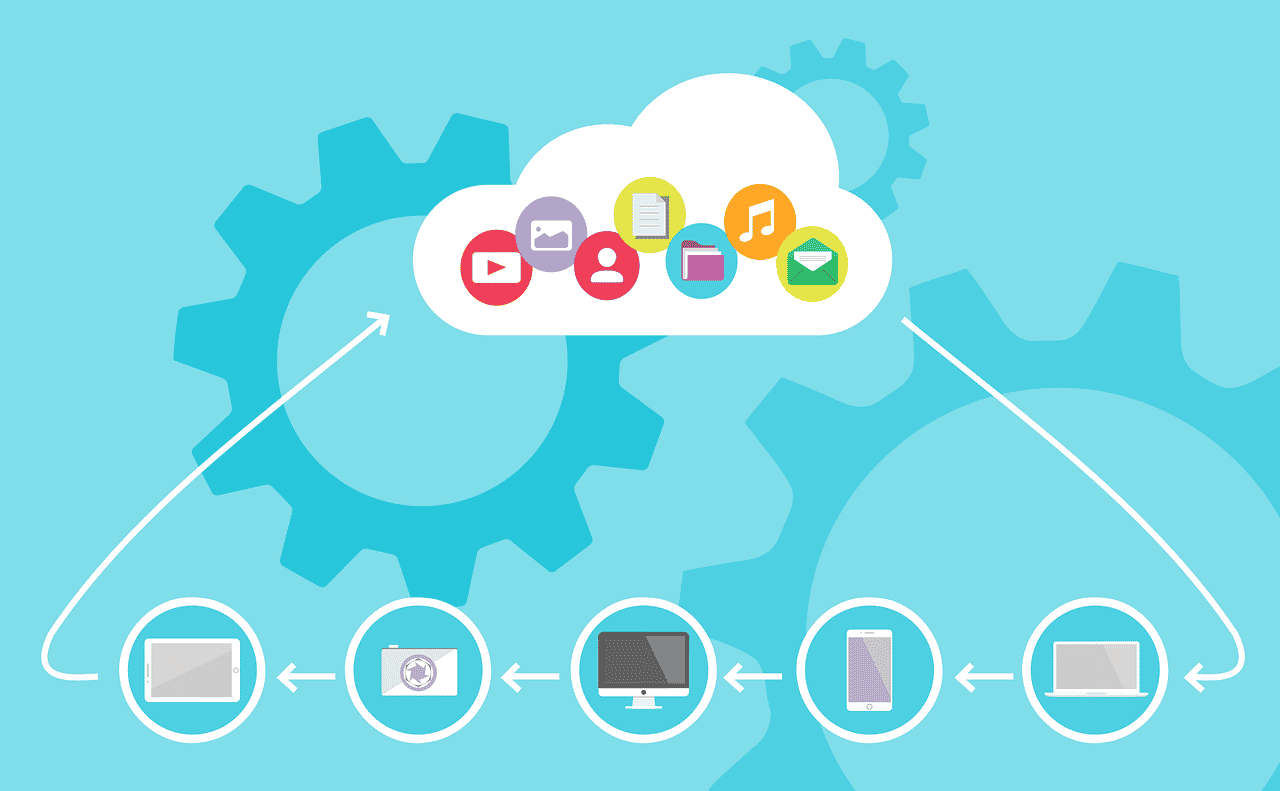Cloud computing has transformed how businesses and organizations access and use technology. Cloud computing provides internet-based services such as data storage, computational power, or application services to customers. It is a model of information technology delivery in which resources like software, hardware, and processing power are provided over the internet instead of on-site.
Instead of having the physical servers and infrastructure in-house where users have to manage everything, cloud computing allows them to store and access data and programs from a third-party remote server. This means businesses can access their applications anywhere and anytime, depending on their needs. Additionally, companies can scale their computational resources up or down to limit their expenditures as needed.
Cloud computing is quickly rising to prominence as one of the most widely used technologies of the 21st century due to its variety of advantages. MarketsandMarkets has stated in their report that the global market size of cloud computing is expected to grow at a CAGR (Compound Annual Growth Rate) of 17.9% to reach USD 1,240 Billion (approx.) by 2027. Considering this surge in demand, gaining familiarity with cloud computing skills is more critical than ever.
In terms of tech skills, cloud computing is one of the most important ones to know if you live and work in an urban city. With technology advancing rapidly, cloud computing skills are essential for any professional looking to stay up to date with the latest trends and be competitive in their field.
Importance of Cloud Computing Skills in Urban Cities in India
Urban cities in India have experienced unprecedented growth over the last decade and have become some of the world’s most densely populated regions. With this rapid urbanization, there is a dire need for better education and training in cloud computing skills. Cloud computing is now an integral part of modern businesses, and there is a high demand for professionals with the right skills to manage it.
Cloud computing has revolutionized how we manage, store, and access data by providing an efficient, cost-effective, and secure system for data storage, communication, and collaboration. As these urban cities are looking to increase their digital infrastructure, the capacity to process, store, manage and use data quickly and efficiently is becoming essential.
With cloud computing, businesses and organizations can access large datasets quickly and use them to gain insights and make data-driven decisions. By accessing cloud computing resources, companies can take advantage of scalable and reliable systems to improve their capacity to gather, analyze and store data. Furthermore, cloud technology helps reduce costs associated with maintaining physical hardware, which is especially beneficial for businesses in cities with high living and operating costs. Additionally, cloud computing skills enable professionals to access and manage resources remotely, enhancing productivity and efficiency.
Thus, cloud computing has become indispensable for businesses and organizations operating in urban cities in India. With companies increasingly adopting cloud technologies, it has become essential for employees to understand and make the most of these technologies. Teaching employees all the essentials through the best cloud computing courses can help them use the opportunities provided by cloud technologies to their full advantage and positively contribute to their organization’s success.
Most In-demand Cloud Computing Skills To Build If You Are In Urban Cities In India
In today’s digital world, cloud computing skills are essential to succeed as an IT professional. Knowing how to manage cloud services, develop cloud applications and use cloud architecture to meet customer needs is vital for any IT job. Furthermore, cloud computing skills can be applied to a broad range of businesses, including e-commerce, banking and finance, education, healthcare, and more.
In urban cities like Bangalore, Hyderabad, Mumbai, Delhi, etc., there is a massive demand for IT professionals with cloud computing skills. Employers are looking for people who can help them leverage the power of the cloud to run their operations more efficiently and effectively. With the increase of startups in these cities, there is a growing need for skilled IT professionals who can take advantage of the cloud to enhance their business.
Consequently, there is a lot of excitement surrounding the cloud computing skills necessary for success in this field. The following is the list of a few of the most sought-after cloud computing skills by employers:
- Technical Skills Needed in Cloud Computing
As the demand for cloud-based solutions increases, the number of technical skills needed to build, maintain and utilize cloud-based solutions is also on the rise. Here are a few must-have technical skills for a successful career in cloud computing:
- Programming Skills
To build and maintain cloud computing solutions, one must understand programming languages like C/C++, HTML, CSS, and JavaScript. Data-oriented languages like Python and R are also vital in cloud computing. Furthermore, basic programming concepts like data structures and algorithms are essential for building, deploying, and testing cloud applications.
- Network Management
Understanding basic networking concepts like IP addresses, DNS, and DHCP is significant in the cloud computing world, as these skills ensure the secure transfer of information between cloud-based applications and users.
- Database Skills
Database management and administration are essential for building, deploying, and managing cloud-based applications that require massive amounts of data. Gaining familiarity with concepts like SQL, relational database management, NoSQL, data warehousing, normalization, and query optimization is essential.
- Cloud Technology
It is essential for any cloud developer to know the ins and outs of cloud computing, including the various types of cloud technology (public, private, and hybrid), their features and benefits, and their architectures. A good understanding of cloud services like Infrastructure as a Service (IaaS), Platform as a Service (PaaS), and Software as a Service (SaaS) is also necessary.
- Infrastructure as a Service (IaaS): IaaS is a cloud computing model in which users can access, configure and manage online virtual computing resources. To do this, users must understand the fundamentals of server hardware, operating systems, and virtual private servers (VPSs).
- Platform as a Service (PaaS): PaaS enables users to quickly build, test, and deploy web applications and services without managing the complete stack. To do this, users need to understand the fundamentals of programming languages, databases, web servers, and application servers.
- Software as a Service (SaaS): SaaS is a method of delivering software that is licensed through a subscription-based model and hosted on the cloud. Users must understand storage, security, and scalability to work with SaaS.
- Linux Operating System
The importance of the Linux OS in cloud computing cannot be overstated. It is incredibly stable, highly secure, and offers an array of cost-saving benefits. It is also a durable and flexible platform, making it ideal for cloud servers. Thanks to its scalability, IT departments can deploy resources more efficiently and save money on expensive hardware upgrades.
Additionally, it is a cost-effective choice for cloud security, providing comprehensive encryption and access control tools. Furthermore, its user-friendly interface makes maintenance and upgrades easy so that admins can spend less time troubleshooting and more time developing and innovating.
These are just some of the essential technical skills needed in cloud computing. As cloud computing continues to evolve, it will be increasingly important for professionals to stay abreast of the latest technologies and best practices to remain competitive in the market.
- Fundamental Skills of Cloud Computing
To take advantage of all the benefits cloud computing has to offer, it’s crucial to have the right skills. Here are some fundamental cloud computing skills you should know if you’re in an urban city:
- Cloud Architecture
Cloud architecture involves:
- Understanding the cloud computing platform
- Designing a suitable cloud infrastructure
- Creating architectures and applications to exploit the capabilities of the cloud
- Cloud Adoption
Knowing how to implement and adopt cloud technology should be a top priority for anyone wanting to use cloud computing. It involves selecting the appropriate cloud services, selecting the best-suited cloud provider, and configuring the cloud environment for optimal performance.
- Cloud Security
It involves understanding the risks associated with cloud computing and developing strategies to mitigate those risks. Securing data on both the cloud and the client side is crucial.
- Cloud Automation
It involves using scripts and tools to automate tasks and processes so that they can be completed in a shorter amount of time and with fewer resources.
- Cloud Analytics
Cloud analytics involves gathering and analyzing data from the cloud to gain insights, understand user behaviors, and make more informed decisions.
- Cloud Migration & Deployment
Migrating to the cloud is a complex process that requires careful planning and understanding of the organization’s current environment. It’s crucial to analyze existing applications and services to determine which are best suited to move to the cloud and which providers offer the best features for the organization’s needs. Proper migration planning also includes assessing data security, compliance requirements, and budget and resource constraints.
Deployment is the next step after migration. In this stage, the organization moves its applications and services to its new cloud-based environment. This often includes setting up software such as web servers, databases, and any other application components that are needed. It’s vital to ensure that the deployment process follows the same security protocols as the previous environment and meets any cloud compliance requirements that may be in place.
- DevOps
DevOps is an approach to software development that emphasizes collaboration between developers and IT operations. DevOps skills are essential for deploying applications on the cloud using advanced automation techniques by eliminating manual processes and making the cloud infrastructure more efficient, secure, and reliable.
Overall, it helps to automate processes, bridge the gap between development and operations, and maintain the health of the cloud infrastructure. DevOps allows businesses to reduce costs and increase productivity, making it an essential strategy for managing cloud computing environments.
Pro Tip: Are you looking to learn DevOps and gain the skills necessary to successfully manage and optimize an organization’s IT operations and infrastructure? This free DevOps course from Great Learning Academy is a one-stop solution for all your needs. With the help of practical demonstrations, the course covers several concepts like Git, Docker, Jenkins, and many more.
- Virtualization and Containers
Virtualization is the process of creating a virtual layer of abstraction between physical computing resources and the software applications and workloads running on them. This virtual layer creates a new environment that can quickly scale up or down the resources used.
Containers are another way of virtualizing resources. When combined, they are a set of files and configurations that create a virtualized environment for running applications. Containers allow applications to be quickly deployed, moved, and scaled independently from physical resources. One of the most widely implemented containers is Docker.
In short, virtualization and containers are essential components of cloud computing, allowing organizations to make the most of their IT resources while maintaining a secure environment. By utilizing these technologies, businesses can quickly deploy applications and scale the resources used to meet their needs. As the demand for cloud computing continues to grow, virtualization and containers will continue to play a vital role in helping businesses keep their IT infrastructure secure and efficient.
- Serverless Architecture
As the name suggests, serverless architecture is an architectural pattern in which a cloud service or application does not require the individual user or entity to maintain or manage servers. In recent years, this has become increasingly popular as organizations of all sizes look for ways to reduce operational costs and enhance scalability.
With its ability to reduce overhead costs, simplify and speed up the development process, and provide improved security, it is a welcome approach for organizations of all sizes. With cloud computing transforming the way businesses operate at a rapid pace, it is clear that serverless architecture will continue to provide value.
- Infrastructure as Code (IaC)
Infrastructure as Code (IaC) revolutionizes how businesses deploy and manage cloud computing architectures. IaC enables IT professionals to create, manage, and decommission cloud resources using scripts and text-based configuration files. This way, IT professionals can take advantage of cloud computing’s scalability and flexibility while still maintaining the security and control of on-premises systems. As cloud computing continues to evolve, IaC will become more vital for businesses looking to maximize their cloud investments.
- Artificial Intelligence (AI) and Machine Learning (ML)
Integrating AI and ML with cloud computing technologies is revolutionizing the way computing tasks are performed. AI and ML allow for faster, more innovative, and more efficient computations, leading to improved data access, scalability, and enhanced security.
The possibilities are endless, and the potential to improve cloud computing is tremendous. As AI and ML become more integrated with cloud computing, it will open up even more opportunities for businesses and individuals alike. The combination of AI and ML with cloud computing is sure to have a significant impact on how we do computing in the coming years.
Pro Tip: Do you want to learn more about Artificial Intelligence and Machine Learning to stay up-to-date on the latest advancements in these areas? Enroll in the best online course for AI and ML designed by UT Austin and advance your careers to stay ahead of the competition and increase your marketability.
- Amazon Web Services (AWS)
One of the leaders in cloud computing is Amazon Web Services (AWS), an Amazon.com subsidiary. AWS is a comprehensive suite of cloud computing tools and services that allows businesses to build, manage, deploy, and scale their operations in the cloud.
AWS provides a platform for businesses to quickly and cost-effectively develop and deploy cloud-based applications and services. The platform includes a suite of cloud computing services like storage, networking, and computing power. With AWS, businesses can launch applications quickly and make changes on the fly to meet customer demand and stay competitive.
AWS also provides a secure cloud environment. With its extensive security infrastructure, businesses can trust that their data remains protected and safe. Furthermore, AWS complies with various regulatory and industry standards, helping companies to ensure compliance with the necessary rules and regulations.
One of the most significant advantages of AWS is its scalability. Whether a business needs to expand quickly or reduce its footprint, it can do so easily with AWS. This scalability helps companies promptly respond to fluctuations in customer demand and keeps costs low. The ability to provision and de-provision resources quickly also helps businesses save time and money.
Finally, AWS offers an extensive range of tools and services that help a business develop, deploy, and maintain cloud-based applications. It includes a wide range of development tools, infrastructure, databases, and analytics services. With these tools, businesses can quickly create and deploy their applications and maintain them over time.
- Microsoft Azure
Cloud computing has become an increasingly integral part of modern businesses, with Microsoft Azure at the forefront of this rapidly-growing technology. As a comprehensive suite of cloud-based services, Azure offers an array of solutions for businesses to manage and streamline their operations.
Azure’s App Services allow developers to quickly and efficiently create reliable, high-performance web and mobile applications, as well as seamless integration with existing applications. They make it easier for users to benefit from the efficiency of cloud computing without worrying about the complexity of setting up their own infrastructure.
Azure also offers a wide selection of storage solutions, from Azure Storage to Azure Data Lake. They make it easier for businesses to store massive amounts of data, as well as offload any intensive data processing to Azure’s servers for improved performance. With Azure’s built-in security features, users can rest assured that their data is safe and secure in the cloud.
In addition, Microsoft Azure also provides a range of powerful analytics and machine learning tools. These enable businesses to explore new opportunities and increase the efficiency of their operations. By leveraging the power of analytics and machine learning, companies can make data-driven decisions and gain valuable insights into their customers and operations.
Finally, Azure offers a range of data migration solutions, making it easy to move data from existing databases and applications to the cloud. It ensures that businesses can take full advantage of the scalability and cost-efficiency of cloud computing without worrying about the complexity of migrations.
- Google Cloud Platform (GCP)
Google Cloud Platform is a set of cloud computing services offered by Google. It provides computing, applications, storage, and analytics services that can be used to develop, test, and deploy applications. With GCP, businesses can quickly spin up services and take advantage of the scalability and reliability of Google’s global infrastructure.
One of the critical features of GCP is its ability to provide developers with the flexibility and control to deploy applications on various platforms and operating systems. GCP allows developers to choose the right compute instance for their application with the ability to scale on demand. It means developers can rapidly deploy applications with the assurance that they can scale quickly with increased usage.
GCP also provides businesses access to powerful artificial intelligence (AI) capabilities. Companies can leverage the power of Google’s AI products, such as TensorFlow and Google Cloud ML Engine, to build AI applications that can automate tasks and provide insights into data.
How Can You Learn Cloud Computing In An Urban City In India?
Cloud computing is on the rise, and India is no exception. With urban cities leading the way in tech innovation, many people in India are looking to learn cloud computing as a way to stay ahead of the curve.
So how can someone in an urban city in India learn cloud computing? The answer is easier than you think. There are a variety of online courses, tutorials, and certification programs designed for those of any skill level that wish to learn about cloud computing.
The best way to learn cloud computing in India is to enroll in a professional course. This course is offered as a part of a more extensive, comprehensive curriculum specifically designed to teach people all the essentials of cloud computing. It equips you with all the necessary tools, techniques, and skills needed to become a cloud professional and stay ahead of the curve.
Without further ado, let’s discuss the significance of cloud computing in an urban city in India and how you can master its skills.
Cloud Computing in Bangalore
Cloud computing has become one of the most sought-after technologies in Bangalore. Due to the city’s high concentration of businesses and large population, the demand for cloud computing solutions is tremendous. In recent years, the number of companies in Bangalore using cloud computing services has increased drastically, with many businesses utilizing the cloud for their operations.
In addition to businesses, cloud computing is also being used extensively by the educational sector in Bangalore. Educational institutions in the city are using cloud computing solutions to store and manage large amounts of data and to offer cloud-based solutions for learning and academic purposes. This has helped improve educational outcomes in the city, as well as allow students to access educational resources from any location.
Considering this massive demand for cloud computing, numerous organizations are constantly looking for experts who have earned cloud computing certification in Bangalore. Great Lakes Executive Learning has designed a top-notch cloud computing course in Bangalore that focuses on empowering professionals to fast-track their careers in Cloud Computing. This postgraduate program is ideal for those looking to become cloud professionals with the ability to work on platform-agnostic and cloud-based solutions for organizations.
Cloud Computing in Hyderabad
Hyderabad is a significant city in Telangana, India, and is one of the largest IT hubs in India. The city is home to many businesses, educational institutes, tech giants (Microsoft, Google, Oracle, Amazon, etc.), and several others. As such, the demand for cloud computing solutions in Hyderabad has grown exponentially in recent years.
Hyderabad has witnessed a tremendous increase in demand for cloud computing solutions for various sectors such as healthcare, education, finance, and so forth. It is due to the fact that cloud computing can enable organizations to store, access, and analyze vast amounts of data. This data can then create better products, services, and experiences for customers, allowing them to stay ahead of their competition.
Finally, cloud computing allows organizations to improve their IT infrastructure and keep up with the latest technologies. It is imperative in a city like Hyderabad, where the tech industry is constantly evolving.
Overall, the demand for cloud computing in Hyderabad is proliferating. Many businesses are always looking for professionals who have obtained a cloud computing certification in Hyderabad. A top-notch cloud computing course in Hyderabad from Great Lakes Executive Learning is focused on enabling professionals to quickly advance their careers in cloud computing. This postgraduate program is excellent for those who want to work as cloud professionals developing platform-neutral and cloud-based solutions for businesses.
Cloud Computing in Delhi
Delhi, the capital of India, has seen a significant rise in the need and demand for cloud computing services over the past few years. Businesses, organizations, and individuals are all beginning to realize the advantages of using cloud solutions. In Delhi, organizations are increasingly turning to cloud computing solutions to reduce their costs and improve efficiency.
Cloud computing offers greater scalability in Delhi, as businesses and organizations can quickly and easily scale up their cloud infrastructure depending on their needs. It allows them to scale their services up and down as required without making costly and time-consuming IT investments.
Overall, cloud computing is becoming increasingly popular in Delhi, with businesses and organizations of all sizes turning to cloud solutions for their computing needs. It offers a wide range of benefits, from cost savings to improved efficiency and better security, which makes it an attractive option for organizations in Delhi.
Given the enormous demand for cloud computing, many businesses are always looking for professionals who have obtained cloud computing certification in Delhi. Great Lakes Executive Learning’s top-notch cloud computing course in Delhi is designed to help professionals quickly advance their careers in cloud computing. People who want to work as cloud professionals creating platform-neutral and cloud-based solutions for businesses should definitely consider this postgraduate program.
Cloud Computing in Chennai
The growth of cloud computing in Chennai, India, has been nothing short of phenomenal over the past few years. This technology is revolutionizing businesses, providing greater security, scalability, and cost savings for enterprises, both large and small.
Cloud computing is allowing businesses to move away from traditional hardware and software and instead focus on their core business operations. With the ever-growing demand for cloud computing in Chennai, it’s clear that this technology is here to stay and will continue to change the way people work.
Businesses of all sizes are looking to take advantage of this technology’s numerous benefits and hunting for professionals who have obtained cloud computing certification in Chennai. This excellent cloud computing course in Chennai from Great Lakes Executive Learning is made to assist professionals in quickly advancing their careers in cloud computing. This postgraduate program is an excellent option for people who want to work as cloud specialists developing platform-neutral and cloud-based solutions for companies.
Cloud Computing in Mumbai
The Indian IT landscape is changing, and cloud computing is becoming increasingly popular in Mumbai. In this city, cloud computing technology is gaining momentum due to its ability to facilitate the rapid launch of products and services for enterprises. Cloud services provide quick access to resources that can quickly be deployed, improved, and scaled as needed. This helps businesses accelerate the process of launching new products and services, allowing them to stay competitive against their rivals.
In summary, cloud computing provides numerous advantages for businesses in Mumbai, making it an excellent technology choice for organizations looking for increased scalability, cost-savings, enhanced security, and ease of use. As cloud computing continues to grow, organizations in Mumbai can expect to see an increased demand for cloud-based services shortly.
Businesses of all sizes are searching for professionals with cloud computing certification in Mumbai in order to take advantage of this technology’s many advantages. To help professionals advance their careers in cloud computing quickly, Great Lakes Executive Learning is offering a world-class cloud computing course in Mumbai. This postgraduate program is a fantastic choice for those who want to work as cloud specialists creating platform-neutral and cloud-based solutions for businesses.
Cloud Computing in Pune
Cloud computing is quickly becoming one of the most sought-after services in Pune, India. With Pune being one of the fastest-growing cities, it has become a hub of technology and entrepreneurship, and cloud computing services are becoming increasingly popular.
As a result, the demand for cloud computing in Pune is rapidly increasing. With its burgeoning technology and startup scene, cloud computing is becoming a popular choice for businesses in the city. More and more companies are now looking to the cloud as an alternative to traditional on-site solutions. The city’s growing demand for cloud computing services is expected to continue in the coming years.
Consequently, companies of all sizes are looking for experts with cloud computing certification in Pune in order to benefit from this technology’s multiple advantages. Great Lakes Executive Learning offers a top-notch cloud computing course in Pune to assist professionals in quickly advancing their cloud computing careers. This postgraduate program is an excellent choice for people who want to work as cloud specialists developing platform-neutral and cloud-based enterprise solutions.
Summing Up
In conclusion, cloud computing skills are essential for IT professionals in urban cities in India. In metropolitan cities like Delhi, Mumbai, Bangalore, and Hyderabad, among many others, there is a massive demand for IT professionals with cloud computing skills. Employers are looking for people who can help them leverage the power of the cloud to run their operations more efficiently and effectively. With the increase of startups in these cities, there is a growing need for skilled IT professionals who can take advantage of the cloud to enhance their business.
Those living in urban cities should consider learning the cloud computing skills mentioned above to land lucrative opportunities in the IT industry. With the right skills, one can pursue their dream career in a rapidly expanding and ever-evolving industry. With the proper training, professionals can gain the skills required to leverage the power of the cloud and stay ahead of the competition. With the right qualifications, IT professionals can prove themselves as valuable assets to their employers by using the cloud to their advantage.








